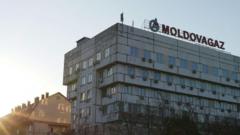With New Year's Day marking the halting of Russian gas via Ukraine, Moldova and its breakaway region Transnistria face dire implications, raising concerns over economic stability and political manipulation by Moscow.
Moldova's Energy Dilemma: A Crisis Ignited by Stopped Russian Gas Flow

Moldova's Energy Dilemma: A Crisis Ignited by Stopped Russian Gas Flow
Moldova confronts a looming energy crisis as Russian gas supply ceases, affecting not only Transnistria but the entire country.
On January 1, the flow of Russian gas through Ukraine ceased, an act that Kyiv heralds as historically significant due to its refusal to extend a transit agreement with Gazprom. While this affects Ukraine's funding for its resistance against invasion, the consequences echo into neighboring Moldova, where an energy crisis looms large.
In Transnistria, a Moscow-aligned separatist region of Moldova, residents are facing harsh realities. Dmitry, a local, reported that only critical infrastructure like hospitals were receiving heat. “The hot water was on until about 2 a.m., but now it's off, and the radiators are barely warm,” he shared, reflecting the struggle faced by many. Transnistria relies heavily on Russian gas, which, until now, has been supplied with little to no financial demand. However, now that the Ukrainian transit has been halted, the region is scrambling to find alternative heating.
Authorities in Transnistria have started establishing "heating points" and are urging families to gather in single rooms for warmth as temperatures plummet. Reports from local residents indicate a chill setting in indoors amidst predictions that January weather could plunge below freezing.
Meanwhile, while electricity remains for now, Transnistria’s main power station, which previously relied on gas, is resorting to coal, with reserves expected to last only 50 days. This poses an additional threat to the rest of Moldova that relies on this plant for 80% of its electricity. The Moldovan government reassures that it has a stockpile of gas for the winter's duration but is preparing for energy cuts, further complicating the current state of emergency declared last month.
The impact of halting gas supplies extends beyond Moldova’s borders, influencing Slovakia and Hungary, which have been slower to divest from Russian energy resources. The consequences of increasing energy costs hit harder for Moldova, a nation grappling with economic fragility. Concerns mount that Moscow may be leveraging this crisis to destabilize Moldova ahead of the parliamentary elections set for 2025.
Olga Rosca, a foreign policy adviser to Moldova’s president, argues that the energy situation is fundamentally a security crisis instigated by Russia. The tensions remain palpable as Moldova strengthens its efforts to integrate with the EU, illustrated by the recent electoral success of President Maia Sandu amidst alleged interference from Moscow.
Adding to the precarious political landscape, the Russian intelligence community has propagated unfounded claims of Moldova’s intentions to militarily reclaim Transnistria, casting Sandu in a negative light. Analysts, including Jakub Pieńkowski, express concerns that the Kremlin may use the energy crisis to incite political unrest, especially as Moldova's energy prices have recently skyrocketed.
As conditions worsen in Transnistria, Moldova is likely to increase the pressure on its administration for more significant responses, though Tiraspol's government has thus far rejected aid offers. Local residents like Dmitry emphasize the poverty and lack of resources already plaguing the region, highlighting that the situation is unsustainable for those already on the brink.
Experts speculate that the impending energy crisis could reshape political allegiances in Moldova as voters, faced with energy deprivations, may lean towards parties that advocate a return to pro-Russian ties.






















